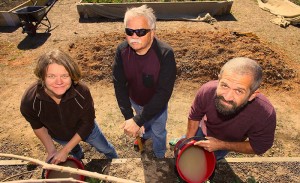While the garden’s produce is shared among members, the greatest reward is bringing people together. A number of different groups are now regularly involved, from primary and high school students to participants in the Jobs Australia work-for-the-dole program, TAFE trainees, Aboriginal Elders, and members of the local community.
Kate’s research is driven by a desire to integrate social theory with practice.

Dr Kate Wright, Steve Widders, and Rob Waters
“The garden project is an experiment in ‘public humanities’. Daily research practice is grounded in the soils of the garden, and in a community research partnership that aims to provide outright benefits to Armidale’s Aboriginal community, bridging socio-economic and cultural divides.”
One example of public humanities research was the From the Garden science engagement project held over three months last year and funded by Inspiring Australia as part of the New England Northwest Regional Science Hub. Academics, students, artists, horticulturalists joined local Aboriginal community members to share knowledge in the Arts and Sciences. Aboriginal weaving practice, language revival and environmental knowledge engaged with Western academic disciplines, promoting dialogue and awareness across the two.
“Indigenous scholars across the globe continue to emphasise the need to legitimise indigenous knowledge systems and methodologies within academia, and this is our aim.”
In 2016 the garden will continue to host a range of cultural and academic events, becoming a common venue for community groups including the Tamworth Armidale Aboriginal Children’s Service (TAACS) and the Armidale Aboriginal Women’s Group.
Dr Kate Wright’s postdoctoral project, ‘Nourishing Culture and Developing Social Capital in a Community Garden’, involves working collaboratively with local Aboriginal community members, organisations and Elders. It is funded under the UNE Postdoctoral Research Fellowships program.

